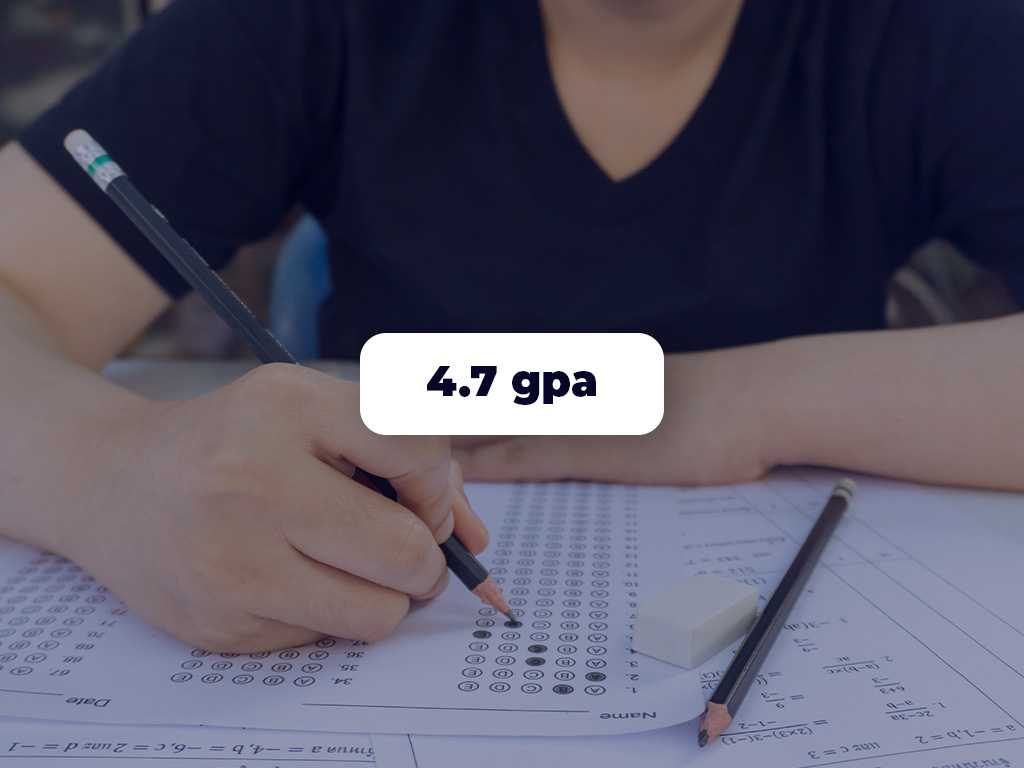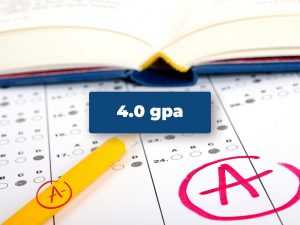Are you concerned about your High school score of 4.7 GPA? Is a 4.7 GPA good, or is a 4.7 GPA unweighted? If yes, you are at the right place here. We will be discussing everything regarding your GPAs. Even if your GPA score is low, we will also tell you how you get a 4.7 GPA. First of all, let’s begin with the following question:
What is a GPA?
A Grade Point Average (GPA) reflects a student’s performance. In some cases, secondary, undergraduate, postgraduate, and even doctoral programs may use this structure for pre-research education. In addition, candidates for further career growth, academic awards, and even potential employers consider this GPA because it accurately portrays a candidate’s aptitude and expertise in a given sector.
What is the purpose of a GPA?
The GPA/Grade Point Average is a grading system that serves as an indicator of a student’s academic progress throughout the degree. Using this method, educational institutions can determine where an applicant stands academically based on the classes. Therefore, the grade point average (GPA) is a good indicator of a student’s overall academic success and performance in each class.
Admissions Officers frequently use applicants’ GPAs in the initial screening phase of applications. The GPA provides a more accurate assessment of a candidate’s degree performance than a certificate indicating whether or not the candidate passed or failed.
When applying for various educational and professional opportunities, candidates must provide their GPA. For example, students who want to join multiple campus organizations and clubs and apply for scholarships must frequently meet this criterion. Furthermore, applicants for master’s and doctoral degrees must have a high GPA.
How to Evaluate GPAs?
Your Grade Point Average (GPA) is the grades you receive from professors and instructors, which measures how well you’ve done academically throughout your degree program. You have an average Grade Point Average (GPA) for each semester, term, and year, representing how well you did in each of your classes. Your GPA will fluctuate throughout your college career based on how far you progress in your academics (or, in some cases, how much you fell behind).
Every grade you receive earns you a quality point, whether expressed numerically, in letters, or percentages. A quality point scale of 4.0 ranges from 0 to 4. (or a multiple of 4). The highest number you can get on that scale is an A, 10, 5, 100 percent, etc.
In the United States, an A is the highest possible grade. Depending on which school you attend, A is either four or a multiple of 4. (e.g., 8 or 16). Finally, the total number of credits earned in each course is multiplied by the total number of credits earned in each class, and the total number of credits earned in each course is divided by the total number of credits earned in each course. This score is used to calculate your GPA.
| Points | Letter Grades | Percentage range |
| 0 | F | <60% |
| 1 | D | 60-69% |
| 2 | C | 70-79% |
| 3 | B | 89-89% |
| 4 | A | 90-100% |
You can evaluate your GPA, or grade point average, by adding up your grades from all of your classes. It’s intended to provide you with an overall Grade Point Average (GPA) ranging from 1.0 to 4.0 based on your grades throughout your academic career. This number is then used to determine whether you meet the standards and expectations of your degree program or university.
What is the difference between Weighted and Unweighted GPAs?
In most cases, unweighted GPAs range from 0 to 4.0. It means that the difficulty of your courses will not be considered. So it makes no difference whether you get an A in an easy or challenging class.
Weighted GPAs are the best option for a more accurate assessment of your academic performance. Furthermore, they employ a different scale, ranging from 0 to 5.0. When calculating weighted GPAs, the difficulty of the courses you take is considered. An ‘A’ in a more accessible class, for example, is graded as a 4.0, whereas an ‘A’ in a more challenging course is graded as a 5.0.
Weighted scales, in essence, encourage students to take on more challenging classes because they know that failing to earn an ‘A’ will not have a significant impact on their GPA. Weighted scales can also help with class rankings. It would be unfair to compare the 4.0 GPAs of two students getting an ‘A’ grade who took the easiest and hardest classes available at their school. Students with GPAs of 4.7 or higher would outperform those with 4.0 simply by taking more challenging courses.
Is the 4.7 GPA unweighted?
A GPA above 4 indicates that your institution employs a weighted GPA system (class difficulty is considered in conjunction with your grades). A 5.0 GPA is the highest possible in most high schools. If you got a 4.7 GPA in high school, you might probably do well in college. You’re most likely getting As and high Bs in upper-division subjects.
So the final answer of “is a 4.7 GPA unweighted” is a big No! Any grade point average more than 4.0 is considered weighted. So next time someone asks you, is the 4.7 GPA unweighted or weighted? Tell them it’s weighted.
So, is a 4.7 GPA good?
The national average GPA is around 3.0, so a 4.7 GPA is well above the national average. However, keep in mind that the 3.0 national average represents the average GPA of all students, not just those applying to universities.
If you still want to know if a 4.7 GPA is good or not, remember it all depends on which university or college you’re applying to, and your GPA is only one factor. GPAs of at least 3.5 may be required for students applying to prestigious universities. Of course, if your GPA isn’t relatively as high, you can still apply to schools with lower admissions requirements (2.5 or sometimes even as low as 2.0).
The type of GPA is also taken into account by university and college admissions committees. For example, because GPAs are evaluated in context, and all details are considered, a university may prefer the first student with a 3.0 GPA who takes advanced classes over the second student with a 3.5 GPA who does the same but takes accessible courses. Now, if you have got the answer of “is a 4.7 GPA good,” let’s move further to the following question: How do you get a 4.7 GPA?
How do you get a 4.7 GPA?
This question, “How do you get a 4.7 GPA,” indicates you might be earning low scores or you want to improve yourself. Most colleges and universities make it difficult to achieve a 4.7 GPA; however, there may be two exceptions for achieving this score.
- Pass/Fail class: This is also an option if your school has a pass/fail policy. Some schools may not give you a letter grade if you choose to take a class as a pass/fail. A passing grade is awarded if the performance is satisfactory; if the performance is unsatisfactory, a failing grade is awarded. Passing a test does not affect your grade point average in most cases; however, failing a test can lower your GPA. Pass/fail policies are uncommon in high school; they are more common in college. It’s possible that at your school, this isn’t an option.
- 5.0. point classes: A GPA of 4.7 is much more likely if you attend a school where some courses are worth more than four points (such as 5.0). The goal is to take as many classes as possible with a weight of at least 4.0. Even if you have to take 4.0 classes, your GPA won’t drop below a 4.7 GPA. However, if you’re not getting straight A’s, this strategy isn’t going to work.
Conclusion
A4.7 GPA may be perfect, less than ideal, or impossible to achieve depending on your school’s grading policy. In addition, depending on your school’s approach, unweighted classes may require pass/fail opportunities for a 4.7 grade.
We hope you might have received answers to all your questions starting from “What is a GPA, is a 4.7 GPA good, is 4.7 GPA unweighted to how to get it. However, remember that it’s not a total disaster even if you don’t get a 4.7. When you send your GPA to colleges, it comes with a plethora of information that will assist them in gaining a better understanding of your overall performance.

Relevant Articles
Is 30 on ACT Score Good? What Colleges Can I Get Admission With 30 ACT Score?
Have you received an ACT score of 30, and now …
Is 30 on ACT Score Good? What Colleges Can I Get Admission With 30 ACT Score? Read More »
Read More >>Is a 4.0 GPA Good? List of Colleges that Accept 4.0 GPA
4.0 GPA Overview Grade Point Average is the average of …
Is a 4.0 GPA Good? List of Colleges that Accept 4.0 GPA Read More »
Read More >>Is a 2.5 GPA Good? List Of Colleges Which Accept 2.5 GPA
Have you attained a 2.5 GPA and wondering which colleges …
Is a 2.5 GPA Good? List Of Colleges Which Accept 2.5 GPA Read More »
Read More >>1600 SAT Score: Colleges that Accept 1600 SAT and How to Achieve it.
Assuming that you have just learned that 1600 is a …
1600 SAT Score: Colleges that Accept 1600 SAT and How to Achieve it. Read More »
Read More >>




















Comments: